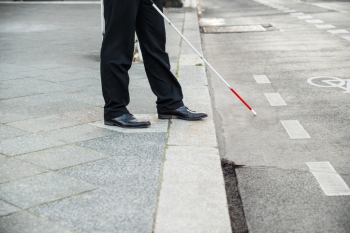I Woke Up Blind: 5 Dark (And Drunk) Realities After Sight

Sight is the best: We can stare at the sun with it, look at seditious material, read classified documents -- all fun and highly advisable activities! That's why it sounds so awful to live without it. We spoke to Audrey, who went blind as an adult from hydrocephalus, and Lynsey, who lost her eyesight to acute glaucoma. Here's what they told us ...
One Day, You Might Just Wake Up Blind
One day, Lynsey fell into bed the same way a lot of us do every Friday night and occasional Tuesday: with a massive headache. She "assumed it was just a migraine, so as soon as my six-year-old went to sleep, I went to bed to try to sleep it off."
The next day, however, "I awoke and thought it was weird and a little bit gross that my eyes had been glued shut by the sandman, so I gave them a rub ... after rubbing and scrubbing some more, I realized that my eyes were open and that I was actually touching my eyeballs."
Hey, that's a brand new phobia we just got!

Somehow Lynsey chose to continue living -- perhaps because she had a young daughter who needed to get to school.
"My thoughts were if I could just hold myself together until she gets to school, THEN I can fall apart," she says. To keep her daughter from panicking about the whole "Mom is blind now" thing, she employed the time-honored parenting trick of turning crises into fun.
"I said to my daughter, 'Let's play a game. Let's see how good you are at making your breakfast!' I carried this on throughout getting the both of us dressed: 'Does mummy look beautiful and dressed, or does she look silly?' We walked at what was probably slower than snail's pace. I was feeling everything on the way with one hand, whilst holding my daughter's hand in the other."

Luckily, Lynsey lived very close to her daughter's school, and there were no roads to cross on the way, but that's still pretty impressive. We're pretty sure we couldn't have made it to the bathroom without somehow falling off a cliff, Looney Toons-style.
Audrey had the benefit of knowing she was going blind, so she could plan ahead. One step is "blind boot camp," which is apparently a real thing. "First, I took mobility classes to learn how to get around using a white cane," she says, "They also do computer training. Cooking classes, where I'm sad to say not a single fire was started while I was there, though while organizing a spice cabinet during my first week at school -- since I didn't read enough Braille yet to read the labels on the spice bottles -- they suggested I sniff the spices to find out what they are. Naturally, one of the first spices I took a fat whiff of was white pepper ... My sinuses were never clearer than they were on that day."
Hilarious slapstick aside, there were some much more frightening challenges: "Your mobility final is: they leave you somewhere, and it's up to you to find your way back," Audrey says. If that sounds like the premise of a cruel reality show, that's basically how it played out.

"Coming up on today's episode of Human Frogger ..."
"They left me on Telegraph in Berkeley, and I was supposed to go further into Berkeley, but I got turned around and ended up in Oakland, where some lovely gangsters helped me find the right bus and I got a free burrito from the Bomb burrito shop since it was by now night, and I'd missed dinner."
That still counts as passing your final, though! Really, the only way to fail is to call it off, die, or just hoof it to Mexico and never come back.
The Adjustment Period Is A Bitch
In time, people who lose their eyesight come to depend on their other senses, but the key phrase there is "in time."
"Have you ever thought about how many times you drop something?" Audrey says. "I'm super clumsy and that's not great when you're blind. Every day, I lose something."
Even something as basic as wiping your ass becomes flummoxing.
"I think that if Greenpeace knew the amount of loo roll I used in those first few months, they would string me up," Lynsey says. "It was definitely a case of use as much loo roll as you can until the wiping felt different. If the loo roll started to drag on my skin I knew I was clean."

It also becomes uniquely clear how many words there are in the world, and not all of them can be printed in Braille, or pleasantly read aloud to you by Stephen Fry. Lynsey's unfortunate mishaps have included buying dog treats instead of cookies, and brushing her teeth with antiseptic cream.
"Filling the bath for myself and my daughter was also scary," she says. "A few times I overflowed the bath, or filled it with scalding/ice-cold water."
But not everything depends on eyesight: Audrey does her own plumbing, and knows other "blind people, who were good at fixing cars when they could see -- and they're still good at it," she says. "My gram's neighbor worked on cars as long as I knew him ... He just spends a lot of time feeling up what's under the hood so he can get to know her (cars are all female), as well as feeling what's under the chassis.

"Also, when you're driving a car, you can often tell what's wrong with it based on the sound it's making or if something is leaking by how it smells."
Although hopefully someone else drives it away.
You Can Still Hallucinate Sight
As long as you had at least a few solid years of being able to see first, it's totally possible to hallucinate when you're blind.
"I can still trip balls visually, though what I see now is different," Audrey says. "The first time I figured this out was when I took some Ambien. I have terrible insomnia (thank you, blindness) and the bottle said to take one, so I took four."

"I didn't feel sleepy, but all of a sudden there were beautiful colors everywhere. But every time I tried to touch them, they disappeared. My husband, who was sober, thought this was awesome to watch/listen to. So I called my old roommate from blind boot camp and was like, 'Girl I can see! It's like a beautiful quilt of colors but I can't touch it, I think I should call my grandma and tell her about the quilt.' She and my husband convinced me not to call my gram."

Your dreams go bonkers as well: "Holy shitballs, has it affected the way I dream," Audrey says. "I didn't used to dream a lot, but when I did, they generally weren't happy dreams. Now I dream every damn night, and they're crazy vivid and mostly crazy scary."
Science isn't certain what makes blind people have more nightmares, but the theory is that it's because they're under so much stress, being blind and all. To fight the clowns waiting to eat her soul in dreamland, Audrey has to drown them in sedatives, but even so, she still "kind of dread falling asleep."
As Audrey alluded to earlier, blindness can also mess with your ability to sleep. It's called non-24-hour sleep-wake disorder, and it's when the inability to perceive light confuses your body and your circadian rhythm goes all to shit, scientifically speaking.

"I actually had a very, very regimented sleep pattern -- I went to bed at 9 p.m. every night with very few exceptions -- since I was five years old," Audrey says. "Ninety-nine percent of the time, it was bed at 9 p.m., asleep within 30 minutes, no dreams, and up around 7:30 a.m. Now that I'm blind, my sleep schedule is all over the place ... At least once a week, I can't sleep at all, and every other month or so, I go through a three to five day stretch where I don't sleep. Around day 3 or 4, I start tripping balls and not in a fun way ... It gets really hard to concentrate, I get even more clumsy than I normally am, and I go a bit insane emotionally."
And she can't even watch infomercials all night instead of sleeping. Surely, that must be what hell is like.
Substance Abuse Is A Serious Problem
Lynsey puts a positive spin on blindness:
"It was the best thing that could have happened to me. Yes, it was a horrible thing, and I wouldn't wish it on anyone, but it gave me breathing space to reevaluate the life I was living. I worked two jobs because of that, I hardly saw my daughter. Nativity plays, special school assemblies, etc., I was never there. I was too busy working ... After going blind I became a better mum. I had to learn everything from scratch so I may as well learn how to do things properly. I began to notice things like the way she changed the way she held onto my hand when she was happy compared to when she was sad about something."
Unfortunately, not everyone can bring themselves to put on such rose-colored Ray-Bans. People who study these sorts of things have pointed out that the visually impaired also tend to be isolated, underemployed, and according to Audrey, left with a chronic case of "really fucking bored." That's why so many of them keep themselves occupied chemically.

"It becomes easy to say 'If I smoke some weed right now, I wouldn't be bored, because I'll be concentrating on being stoned' ... I've observed that an amazing amount of blind people do some sort of drug or drink."
Coincidentally, being blind is also a really great cover for being wasted in public.
"If I have to deal with people, I can totally wear sunglasses and nobody has to see my squinty eyes and know I'm stoned," Audrey says. "Also, if I, say, walk into a wall, I'm not stoned, I'm blind."

Forget about cleavage -- a white cane is an actual "get out of jail free" card.
"My ex-boyfriend and I were walking around downtown once drinking rum and soda out of Big Gulps, because I'm a classy bitch," Audrey says. "We got stopped by a cop who said 'You, ma'am, are obviously swerving because you're blind, but you, sir, are drunk.' He was gonna throw my ex in the drunk tank, but I said I couldn't get home without him, and may have cried a little to give it that something special, so he let him go."
It's not much of a trade-off for all the crushing boredom, and fucked-up dreams, and missing out on Mad Max: Fury Road, but it's something.

You Can Still Watch Movies, Dance, And ... Race Cars?
Actually, blind people can still "watch" movies, after a fashion. Their primary uh ... viewing method (?) ... is descriptive audio, which turns on an audio track that describes what's going on on-screen. In theaters, they can use a descriptive audio device, which accomplishes the same thing, while also enraging nearby sighted moviegoers.

If no description devices are available, it just becomes a matter of choosing wisely. It turns out a lot of what annoys you about a movie is actually really helpful for folks like Audrey.
"The easiest stuff to watch is lots of talking," she says. "So a movie or show with voiceover that explains what the character is thinking or doing works well. The first thing that comes to mind is the Sherlock movies. During the fight scenes, he describes via voiceover what he's going to do in a fight scene before he does it, so even though I can't see the fight, I have an idea of what's going on."
That scene is patently ridiculous for the sighted, so it was awful nice of them to sacrifice artistic integrity just for their blind viewers.
On the other hand, certain genres are right out.
"Most horror films and shows rely highly on the visual element and the musical element, so when the music picks up, I'll know something scary is supposed to happen, but have no idea what that scary thing is. Action movies are a problem for similar reasons. Imagine watching a movie like The Matrix with your eyes closed the entire time."
Hit play and try it right now.
To be fair, at least where the sequels are concerned, it might be an improvement.
When Lynsey went blind, she thought she'd have to give up dancing. Luckily, she discovered one form where sight wasn't an issue: pole-dancing.
"I thought that would be a way of dancing again, without the worry of bumping into people, or falling off the stage -- because you have a pole to hold on to. I have been attending Pole Classes with my amazing instructor for almost three years, and in September last year, I won the first U.K. Competition with a Disabled Category. This year I successfully defended the title."
She's also, against all logic, taken up racecar driving: "A few years ago, I did a sponsored Blind Drive to raise money for Guide Dogs charity. It involved driving a Nissan Micra around the Nissan test track. I had never driven a car in my life."

It sounds like the makings of a Darwin award, "but I got the fastest lap of all the participants: 94 mph." Of course, it helped that she was in "a dual-controlled car, accompanied by a driving instructor."
Fittingly, he gave Lynsey some choice words of wisdom that we would all do well to heed: "Just point where you want to go, and don't die."
Lynsey is an accomplished pole dancer. Check out her Facebook page here.
One of our most popular episodes from 2016 was when we invited Karen Kilgariff and Georgia Hardstark from 'My Favorite Murder' to talk about some of the best true-crime stories out there. So successful, in fact, that we're resurrecting it (get it?) for a part two! Metal Fang, the Strangling Executioner, and the murderer living in the attic just weren't enough. So Jack O'Brien, Dan O'Brien, and the Cracked staff welcome Karen and Georgia back for another creepy hour of serial killers and urban legends that are bound to make you terrified to go outside or talk to a stranger or do anything.
Get your tickets here:
Have a story to share with Cracked? Email us here.
For more insider perspectives, check out 5 Shocking Ways The Modern World Screws Blind People and 5 Reasons Life As A Deaf Person Is Weirder Than You Thought.
Subscribe to our YouTube channel, and check out The Horrifying Truth About Those People In TV Commercials, and other videos you won't see on the site!
Follow us on Facebook, and let's be best friends forever.